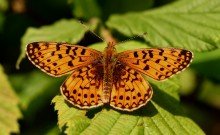Dorset Wildlife Trust (DWT) will be supporting a campaign to review the protection for environmentally important grasslands across the UK, which includes one Dorset’s few remaining large areas of grassland.
Grasslands found in west Dorset’s Kingcombe area are not only one of our finest natural heritages, which have inspired writers such as Thomas Hardy, but are also vital resources to wildlife and of great benefit to people, as they allow landscapes to hold water and reduce flooding. Grasslands also act as filters, and for Dorset, Kingcombe’s undisturbed and un-treated grassland means clean water is flowing down through the river Hooke, into the river Frome.
DWT’s West Dorset Living Landscapes Manager, Debbie Watkins said: “As summer approaches we imagine walking through stunning wildflower meadows, playing sports in fields, or going for picnics. All these activities take place in grassland areas which has great value to each and every one of us, and to lose this would be devastating. But grasslands are under-going decline, with immense pressures such as development, changes in agricultural practices and neglect leaving them fighting for survival.”
Wildlife such as the small pearl bordered fritillary and the marsh fritillary butterflies are at huge risk from the decline of any species-rich grassland. Barn owls, and other pollinators, including bees also depend on wild grasses and flowers, and could suffer from the loss of grassland.
Debbie added: “DWT is working with Dorset’s landowners and farmers to advise them on how to manage grassland through our grassland restoration project, ‘Pastures New’, but we also need support at a national level through the Common Agricultural Policy (CAP) to ensure farmers get the support they need to continue protecting grasslands in Dorset.”
The value of Dorset’s grassland has also been identified in national projects. Kingcombe’s ‘Lady’s Mead’ meadow was selected as part of the ‘Coronation Meadows’ scheme in 2012, initiated by HRH the Prince of Wales in response to concerns over declining meadows in the UK. Seeds from wildflowers in Lady’s Mead, which is a vital food source for wildlife, were taken and used to restore one of 60 new meadows in the UK, to help secure wildflower heritage.
To sign the Wildlife Trust’s petition asking for the Government to take full account of the remaining wildlife-rich grasslands and the threats they face whilst they make key decisions about the Common Agricultural Policy, visit www.wildlifetrusts.org/dontfadeaway
For more information about DWT’s grassland restoration project, please visit https://www.dorsetwildlifetrust.org.uk/westdorsethillsvales.html







